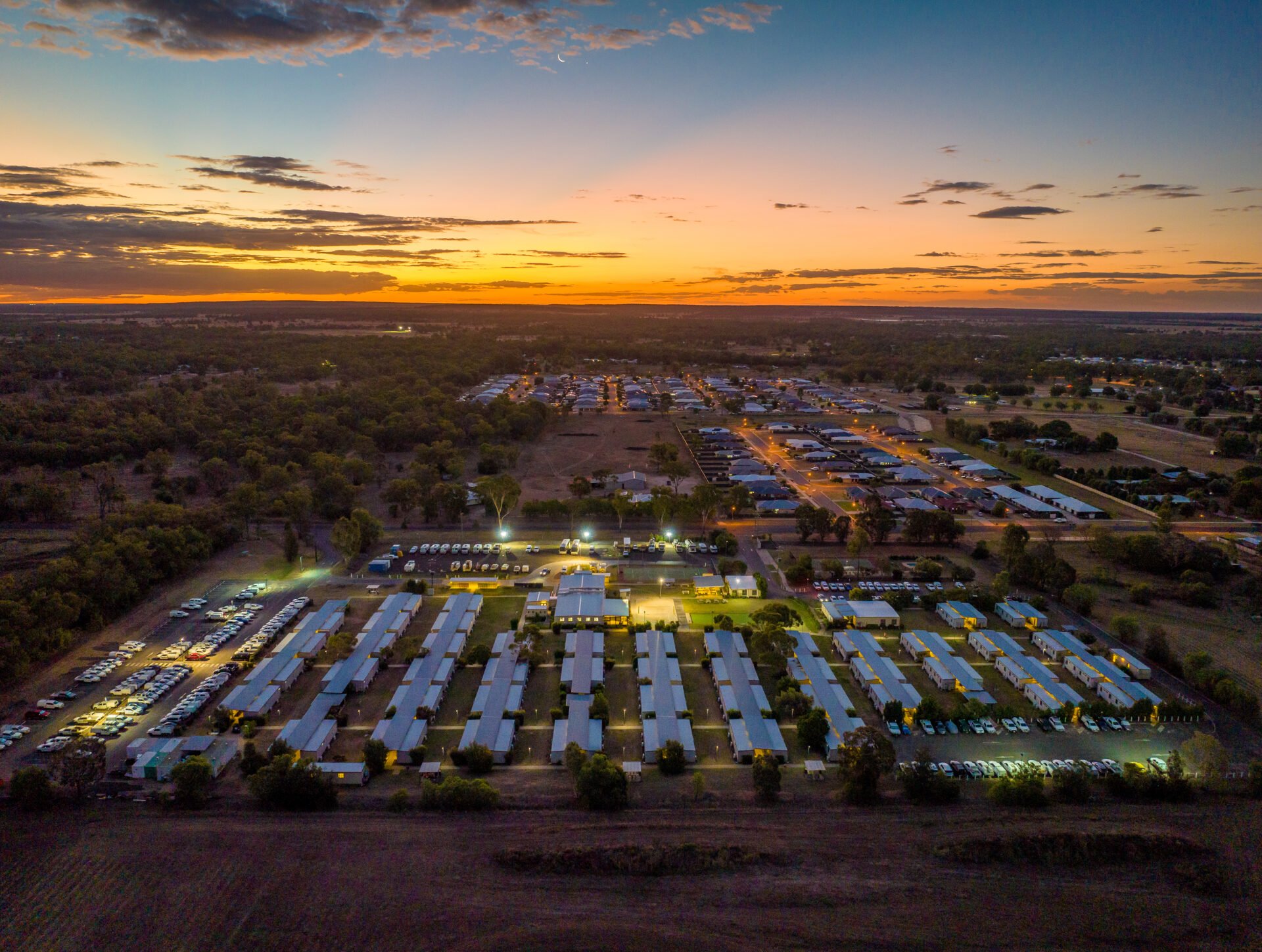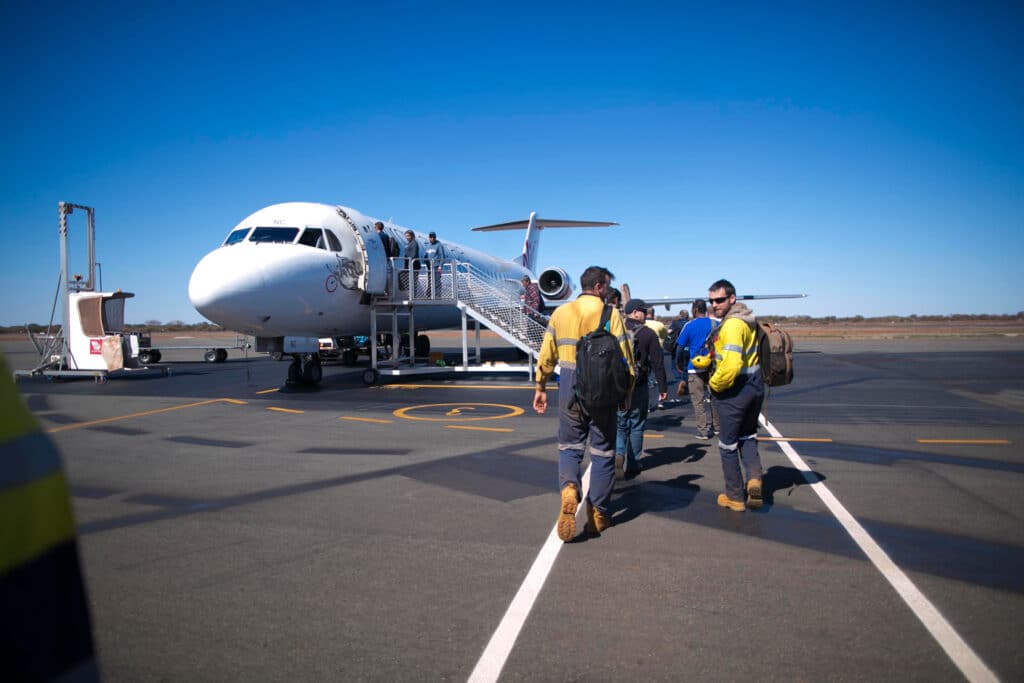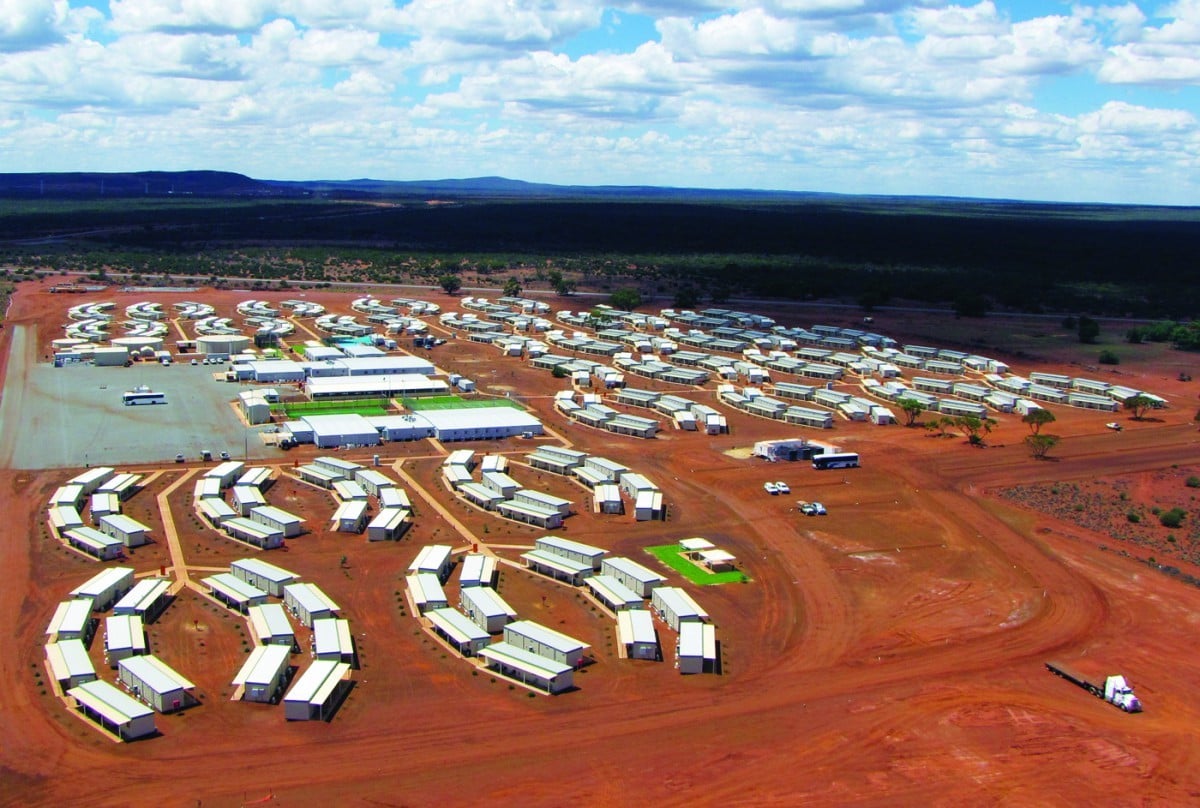How to Get a FIFO Housekeeping / Site Utility Job on a Mining Site in Australia

Key Takeaways
- FIFO housekeeping is in demand: Mining and resource projects across Australia rely on large site camps that need cleaning and maintenance staff.
- Quick entry with short courses: Roles like housekeeping, kitchen hand or utility often only need a few nationally recognised tickets to start.
- Essential tickets boost your chances: White Card, First Aid, and Food Safety are common requirements that make your application stronger.
- FIFO lifestyle comes with perks: Competitive pay, free accommodation and meals, plus flights to and from site covered by the employer.
- Room to progress: Many housekeeping staff move into higher-paid utility or camp management roles with further training.

What is a FIFO Housekeeping / Site Utility Role in Australia?

FIFO stands for Fly-In Fly-Out.
In the mining and resources sector it means you’re flown to a remote site for a set roster, commonly 2: weeks on, 1 week off (or something similar), and stay in on-site accommodation for your shift block.
Housekeeping and site utility workers keep camps running: they clean rooms and common areas, support the kitchen and laundries, move supplies, and complete general facility tasks.
These positions offer competitive pay, regular rosters and the chance to work for Australia’s biggest mining contractors without needing heavy trade qualifications.
What a FIFO Housekeeping or Site Utility Job Involves
The job is hands-on and fast-paced. Each day can vary depending on the site’s needs.
Typical duties include:
- Cleaning of crib rooms, ablution blocks and accommodation units
- General housekeeping across camp and admin areas
- Basic kitchen hand tasks such as meal prep and dishwashing
- Laundry duties and linen changes
- Groundskeeping and general labouring tasks
- Waste collection, stock replenishment and tidiness
- Assisting camp managers or supervisors as needed
Work environments are usually remote camps with full board, which means meals, accommodation and flights are included.
You’re part of a team that keeps the camp functioning so production crews can focus on the mining work.
Below is a quick look at a day-in-the-life of a housekeeper or utility worker on a mining site in Australia:
Key Skills and Personal Attributes Employers Look For
Employers in this industry prioritise reliable, hardworking individuals who can handle remote working conditions.
Important attributes include:
- Physical fitness: You’ll be on your feet most of the shift doing cleaning and lifting.
- Attention to detail: Clean, safe and hygienic environments are crucial on site.
- Teamwork and independence: Being able to follow instructions and also work unsupervised.
- Adaptability: No two days are the same; you might swap between kitchen, laundry and cleaning tasks.
- Safety awareness: Understanding site rules and reporting hazards quickly.
Essential Certifications & Requirements
Before you can be mobilised to site, you’ll generally need to show you’ve completed key certifications and are medically fit.
These include:
| Requirement | Why It’s Needed |
|---|---|
| White Card (Construction Induction) | Mandatory for anyone working on construction or mining sites in Australia. Shows you understand safety basics. |
| C Class Driver’s Licence | Allows you to drive vehicles or buggies around camp; often required for mobilising. |
| Pre-Employment Medical + Drug/Alcohol Screen | Ensures you’re physically fit and can work safely in a remote environment. |
| Police Clearance (if requested) | Shows you meet the company’s security and compliance requirements. |
| FIFO Mobilisation Readiness | Being available and organised to travel at short notice when rosters change. |
Completing these requirements before applying makes you more competitive and speeds up your deployment once you’re hired.
Recommended Training & Courses
Although you don’t need a trade qualification, short courses give you an edge. National Courses offers several that align with FIFO housekeeping and utility roles:
- Housekeeping or Hospitality Short Courses: Cover cleaning standards, hygiene and customer service.
- Workplace Health & Safety Training: Deepens your understanding of hazard identification and reporting.
- First Aid & CPR Certification: Highly regarded by employers; adds safety value on site.
- Manual Handling Courses: Teaches correct lifting and moving techniques to avoid injury.
These certifications and micro-credentials demonstrate commitment, improve your skills and help you stand out in a crowded applicant pool.

How to Apply for FIFO Housekeeping Jobs
Once you have the essential requirements, you can start applying. The good news is FIFO housekeeping roles are advertised year-round by contractors servicing the mining industry. The key is knowing where to look and how to present your skills.
- Job boards: SEEK, Indeed, CareerOne and Jora list dozens of FIFO housekeeping and utility positions.
- Company career pages: Large employers such as Sodexo, ISS and Compass Group run direct recruitment campaigns.
- Recruitment agencies: Specialist recruiters place workers in short and long-term contracts on remote sites.
When preparing your resume, highlight your relevant experience (hospitality, cleaning, labouring, customer service), your certifications (White Card, First Aid, Driver’s Licence) and your ability to work to rosters.
A short cover letter explaining your willingness to travel and live on site can also help.
Preparing for the Recruitment Process
Applying is just the first step. Most employers follow a clear recruitment pipeline before you are mobilised to site:
- Phone or online interview: Be ready to discuss your experience, availability, and motivation to work FIFO.
- Pre-employment medical and drug/alcohol screening: You’ll be assessed for fitness and compliance with zero-tolerance policies.
- Background and police checks: Ensure you have current documentation and can supply referees quickly.
- Induction modules: Many companies issue online training before you arrive on site.
Having your paperwork organised will shorten the time between application and your first shift. Employers appreciate candidates who can mobilise quickly.
Life on Site – What to Expect Once You Get the Job
Understanding camp life helps you transition smoothly into FIFO work.
Most camps are self-contained communities with accommodation, dining halls, recreation rooms, and gyms.
Flights, meals and uniforms are typically provided by the employer.
- Rosters: Common rosters are 2 weeks on/1 week off or 8 days on/6 days off. Expect long shifts but plenty of downtime between swings.
- Accommodation: Most rooms are single-occupancy with ensuite or shared bathrooms. Linen and cleaning are usually provided.
- Meals: Buffets and crib lunches are standard. Special diets can be accommodated with notice.
- Community: Camps have gyms, TV rooms, Wi-Fi and social activities. Respect others’ space and the camp’s code of conduct.
Adjusting to FIFO life can take a few swings. Maintaining good routines, staying connected to family during breaks and managing fatigue will help you thrive.
Career Progression Opportunities
FIFO housekeeping is often the entry point to a much bigger career. Once you’ve proven yourself reliable on site, you can move up to:
- Team leader or supervisor roles: Overseeing cleaning crews or kitchen staff.
- Facilities coordinator or camp manager: Running the daily operations of a remote facility.
- Transition to mining operations: Many workers shift into trade assistant, storeperson or safety roles after gaining site experience.
Upskilling with management or safety courses while you’re working can fast-track your progress.
National Courses offers pathways into WHS certificates and other qualifications relevant to supervisory positions.
Conclusion
FIFO housekeeping and site utility jobs offer a reliable pathway into Australia’s mining and resource sector without needing heavy trade qualifications.
With the right certifications, a polished resume and a willingness to embrace remote work, you can quickly secure a role and start earning. The experience gained can also open doors to higher-paying roles on site.
National Courses can help you prepare by offering essential training like White Card, First Aid, CPR and workplace safety courses so you’re ready to mobilise and stand out to employers.
Frequently Asked Questions
1. How much can I earn in a FIFO housekeeping or site utility job?
Pay rates vary by company and roster but typically range from $35 to $50 per hour plus penalties and overtime.
Some employers also offer sign-on bonuses or retention allowances.
Because meals, flights and accommodation are included, your take-home pay can stretch further than a city job at the same rate.
2. What is the usual roster pattern for housekeeping or utility roles?
Common rosters include 2 weeks on / 1 week off, 8 days on / 6 off, or even 3 weeks on / 1 week off for very remote sites.
Your exact roster depends on the company, site and project stage. Some large camps rotate rosters regularly to balance workloads.
3. Do FIFO utility workers get training on site, or do I need it all before applying?
Basic inductions and site-specific safety training are provided once you’re hired.
However, having key certifications like White Card, First Aid and Manual Handling before applying puts you at the top of the candidate list and can speed up mobilisation.
4. How can I move up from housekeeping into better-paid roles?
Many site utilities progress into storeperson, catering supervisor, HSE (Health & Safety), or even logistics and administration roles.
Ask for cross-training, volunteer for additional duties, and complete short courses such as leadership, HSE or hospitality management to build your resume while on site.
5. What’s the living situation like on a FIFO camp?
Most camps provide single air-conditioned rooms with ensuite or shared bathrooms, three meals a day, gym facilities, TV lounges and laundry.
Standards vary between older and newer camps but are generally comfortable and clean.
6. How do I handle the isolation and mental health challenges of FIFO work?
Plan regular check-ins with family and friends during your off time, make use of on-site Employee Assistance Programs (EAPs), stay active and build routines.
Knowing your roster in advance helps you plan social and family life to reduce stress.
7. Is there an age limit or gender preference for FIFO housekeeping roles?
On most mining sites, you must be at least 18yrs old to apply. Employers value reliability and fitness over gender.
Both younger workers starting out and mature-age workers switching careers find opportunities in FIFO camps.
Women are widely represented in housekeeping, catering and admin support roles.
8. What’s the recruitment process like for FIFO utility roles?
It usually involves an online application, phone or video interview, reference checks, a pre-employment medical (including drug and alcohol screen), then mobilisation paperwork.
Some large contractors also host information sessions or virtual open days to explain the process to new applicants.
9. Are FIFO housekeeping jobs seasonal or ongoing?
Many camps run year-round to support ongoing mining or construction projects.
Some roles are casual to cover peak periods or shut-downs, but strong performers are often offered ongoing contracts.
Being flexible with rosters increases your chance of ongoing work.
10. What’s one insider tip to land a FIFO housekeeping job quickly?
Have your compliance documents ready in a single PDF: White Card, driver’s licence, police clearance, First Aid and resume.
Employers and labour hire agencies prioritise candidates who can mobilise at short notice — sometimes within a week — when urgent vacancies arise.
Get Job-Ready for a FIFO Housekeeping Career with National Courses

The mining and resources sector isn’t slowing down — it’s expanding across Australia’s remotest regions.
Every month new camps are opening, and contractors are looking for reliable people to keep them running smoothly.
Housekeeping and site utility staff are the backbone of these operations.
Here’s the reality: employers prioritise applicants who already hold the essential safety and workplace certifications.
When you can mobilise at short notice, you jump the queue.
National Courses gives you those essentials — nationally recognised training like the White Card, First Aid, and more.
These are the exact tickets employers ask for when recruiting FIFO staff.
Our courses are simple to book, run across multiple locations, and are designed to get you site-ready quickly.
Once you’re on site, employers will often fund further training to help you move into higher-paid roles — but first you need the basics.
Don’t wait for the opportunity — get certified and qualify for it.
About National Courses
Nationally Recognised Training and Certification for a Wide Range of Industries




National Courses Pty Ltd (RTO 41072) is a trusted training provider offering short, nationally recognised courses across Australia.
We specialise in practical, job-ready training for industries like construction, civil, safety, and first aid — helping individuals and businesses stay qualified and competitive.
National Courses PTY LTD works with government programs, employers, and community organisations to deliver training that leads to real employment outcomes.

On This Page
- Introduction — FIFO Housekeeping / Site Utility Roles
- What the Job Involves
- Key Skills and Attributes Employers Look For
- Essential Certifications & Requirements
- Recommended Training & Courses
- How to Apply for FIFO Housekeeping Jobs
- Life on Site — What to Expect
- FAQs About FIFO Housekeeping Jobs
- Take the Next Step — Get Job Ready



